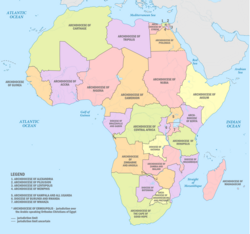
The Eastern Orthodox Church, officially the Orthodox Catholic Church, and also called the Greek Orthodox Church or simply the Orthodox Church, is the second-largest Christian church, with approximately 230 million baptised members. It operates as a communion of autocephalous churches, each governed by its bishops via local synods. The church has no central doctrinal or governmental authority analogous to the pope of the Catholic Church. Nevertheless, the Ecumenical Patriarch of Constantinople is recognised by them as primus inter pares, a title formerly given to the patriarch of Rome. As one of the oldest surviving religious institutions in the world, the Eastern Orthodox Church has played an especially prominent role in the history and culture of Eastern and Southeastern Europe.
The Eastern Orthodox Church, officially the Orthodox Catholic Church and commonly known simply as the Orthodox Church is a communion composed of up to seventeen separate autocephalous (self-governing) hierarchical churches that profess Eastern Orthodoxy and recognise each other as canonical (regular) Eastern Orthodox Christian churches.

The Russian Orthodox Church, alternatively legally known as the Moscow Patriarchate, is an autocephalous Eastern Orthodox Christian church. It has 194 dioceses inside Russia. The primate of the ROC is the patriarch of Moscow and all Rus'.
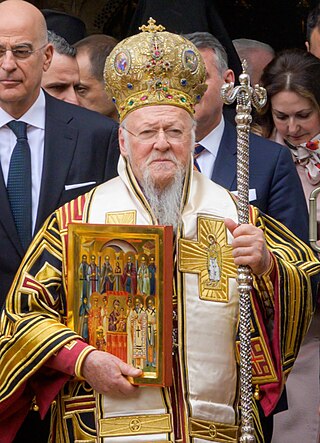
The Ecumenical Patriarch of Constantinople is the archbishop of Constantinople and primus inter pares among the heads of the several autocephalous churches that comprise the Eastern Orthodox Church. The ecumenical patriarch is regarded as the representative and spiritual leader of the Eastern Orthodox Christians worldwide. The term ecumenical in the title is a historical reference to the Ecumene, a Greek designation for the civilised world, i.e. the Roman Empire, and it stems from Canon 28 of the Council of Chalcedon.
The highest-ranking bishops in Eastern Orthodoxy, Oriental Orthodoxy, the Catholic Church, the Hussite Church, Church of the East, and some Independent Catholic Churches are termed patriarchs.

Patriarchate is an ecclesiological term in Christianity, designating the office and jurisdiction of an ecclesiastical patriarch. According to Christian tradition three patriarchates were established by the apostles as apostolic sees in the 1st century: Rome, Antioch, and Alexandria. Constantinople was added in the 4th century and Jerusalem in the 5th century. Eventually, together, these five were recognised as the pentarchy by the Council of Chalcedon in 451.
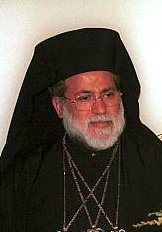
Petros VII was the Greek Orthodox Pope and Patriarch of Alexandria and all Africa from 1997 to 2004. During his reign, Petros VII was credited with reviving the Greek Orthodox churches in Africa by increasing the churches' attendance of about 250,000 people.
Greek Orthodox Church is a term that can refer to any one of three classes of Christian churches, each associated in some way with Greek Christianity, Levantine Arabic-speaking Christians or more broadly the rite used in the Eastern Roman Empire.

Pentarchy was a model of Church organization formulated in the laws of Emperor Justinian I of the Roman Empire. In this model, the Christian Church is governed by the heads (patriarchs) of the five major episcopal sees of the Roman Empire: Rome, Constantinople, Alexandria, Antioch, and Jerusalem.
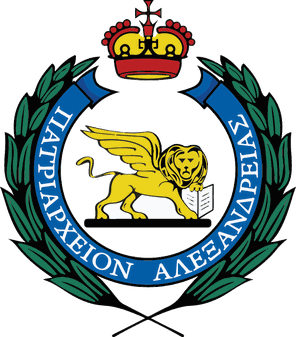
The Greek OrthodoxPatriarchate of Alexandria and all Africa, also known as the Greek Orthodox Church of Alexandria, is an autocephalous patriarchate that is part of the Eastern Orthodox Church. Its seat is in Alexandria, and it has canonical responsibility for the entire African continent.
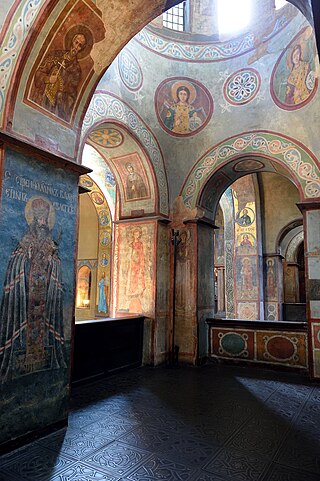
Christianity is the predominant religion in Ukraine, with 85% of the population identifying as Christian according to a 2022 survey conducted by the Kyiv International Institute of Sociology (KIIS). Seventy-two percent of the population avowed fidelity to an Eastern Orthodox Church: 54% of Ukrainians proclaimed adherence to the autocephalous Orthodox Church of Ukraine; 14% identified as Orthodox Christian without specifying a church affiliation; 4% associated with the Moscow Patriarchate. Another 9% of Ukrainians professed devotion to the Catholic Church in Ukraine: 8% Ukrainian Greek Catholics and 1% Latin Catholics. Two percent of the population declared affiliation to a mainstream Protestant Church, and a further 2% identified with some alternative sect of Christianity.
The history of the Eastern Orthodox Church is the formation, events, and transformation of the Eastern Orthodox Church through time. According to the Eastern Orthodox tradition, the history of the Eastern Orthodox Church is traced back to Jesus Christ and the Apostles. The Apostles appointed successors, known as bishops, and they in turn appointed other bishops in a process known as Apostolic succession. Over time, five Patriarchates were established to organize the Christian world, and four of these ancient patriarchates remain Orthodox today. Orthodox Christianity reached its present form in late antiquity, when the ecumenical councils were held, doctrinal disputes were resolved, the Fathers of the Church lived and wrote, and Orthodox worship practices settled into their permanent form.

The history of the Russian Orthodox Church is commonly traced back to the Metropolis of Kiev and all Rus', established upon the Conversion of Volodimer in c. 988 for ecclesiastical administration of Kievan Rus'. Several decades after the end of Kievan Rus' due to the Mongol invasion in 1237–1241, metropolitan Maximos of Kiev and all Rus' relocated to Vladimir on the Klyazma in Suzdalia in 1299, and his successor Peter moved to Moscow in 1325, while still keeping "of Kiev and all Rus'" in their titles.
Eastern Orthodoxy in Uganda refers to adherents and religious communities of Eastern Orthodox Christianity in Uganda. Majority of Eastern Orthodox Christians in Uganda are under ecclesiastical jurisdiction of the Eastern Orthodox Patriarchate of Alexandria and all Africa.
Eastern Orthodoxy in Madagascar refers to adherents and religious communities of Eastern Orthodox Christianity in Madagascar. Eastern Orthodox Christians in Madagascar are under ecclesiastical jurisdiction of the Eastern Orthodox Patriarchate of Alexandria and all Africa.
Phyletism or ethnophyletism is the principle of nationalities applied in the ecclesiastical domain: in other words, the conflation between church and nation. The term ethnophyletism designates the idea that a local autocephalous church should be based not on a local (ecclesial) criterion, but on an ethnophyletist, national or linguistic one. It was used at the local council held in Constantinople on 10 September 1872 to qualify "phyletist (religious) nationalism", which was condemned as a modern ecclesial heresy: the church should not be confused with the destiny of a single nation or a single race.

The Oriental Orthodox Churches are Eastern Christian churches adhering to Miaphysite Christology, with approximately 50 million members worldwide. The Oriental Orthodox Churches adhere to the Nicene Christian tradition. Oriental Orthodoxy is one of the oldest branches in Christianity.
Eastern Orthodoxy in Estonia is practiced by 16.5% of the population as of 2011, making it the most identified religion and Christian denomination in this majority-secular state after surpassing Lutheran Christianity with 9.1% for first time in country's modern history. Eastern Orthodoxy, or more specifically Eastern Orthodox Christianity, is mostly practiced within Estonia's Russian ethnic minority and minority within native population. According to the 2000 Estonian census, 72.9% of those who identified as Orthodox Christians were of Russian descent.
Eastern Orthodoxy in Iraq refers to adherents, communities and institutions of Eastern Orthodox Christianity in Iraq. Within the ecclesiastical order of the Eastern Orthodox Church, territory of Iraq traditionally belongs to patrimonial jurisdiction of the Eastern Orthodox Patriarchate of Antioch and All the East. The Patriarchate has a diocese in Iraq, the Eastern Orthodox Archdiocese of Baghdad, headed since 2014 by Metropolitan Ghattas Hazim.
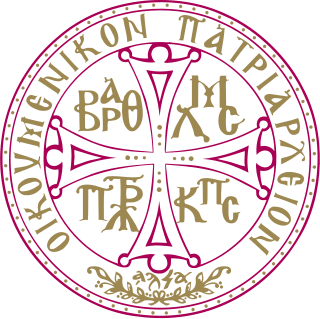
The 2018 Moscow–Constantinople schism is an ongoing schism between the Russian Orthodox Church and the Ecumenical Patriarchate of Constantinople, which began on 15 October 2018 when the former unilaterally severed full communion with the latter.
